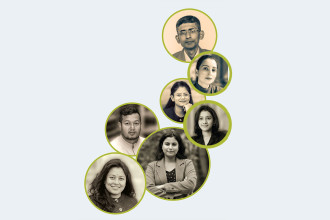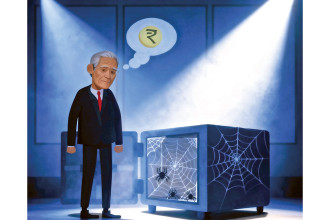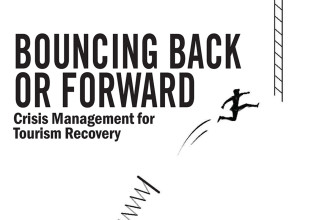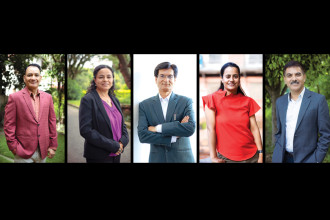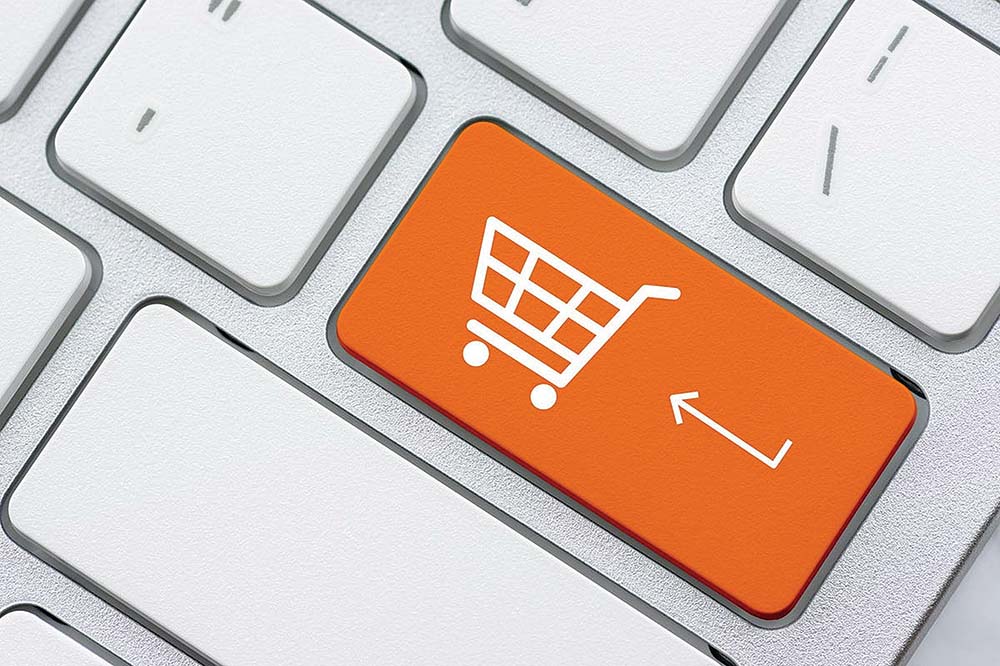
Since the outbreak of the Covid 19 virus, the market has witnessed many changes in not only the ways we interact but also in the ways we do business. In the past two years, we have seen a remarkable increase in digital engagement for shopping and payments.
With availability of vaccines, there has been some level of relief to businesses that were struggling to cope in the pandemic, however nothing is predictable as the virus continues to mutate and raise alarm every now and then. While work life has seen a growth of hybrid models of business and people are coming to terms with living in the new normal, we decided to ask four business personalities about the consumer trends we should be aware of in 2022.
Anil Keshary Shah CEO, Nabil Bank [gallery link="file" columns="1" size="full" ids="18718"]
I believe the dynamics of business have changed vastly in the last two years in comparison to changes that have taken place in the last 20 years. Every sector has been impacted because of Covid but this cannot stop anyone from moving forward in life.Digitisation: The first and foremost is digitisation. I think we need to see how we can use technology to push our business even further. Not only in banking, we can see digitisation happening in other sectors too. Young entrepreneurs are also using the concept of digitisation. Many have started becoming job providers instead of job seekers. The pandemic has helped us see that to run a business we don’t need staff, we don’t need a place and pay rent, we could promote it on Facebook or Instagram, and that’s how businesses have started in the last couple of years. This kind of business has been doing exceptionally well too. The startups have been doing well in going digital and those already established businesses too have to adopt the digital platform to compete in the market. Realise, recognise and adapt to the revolution: We must realise that the market we had in 2020 will not be the same in 2022. I believe the dynamics of business have changed vastly in the last two years in comparison to changes that have taken place in the last 20 years. Every sector has been impacted because of Covid but this cannot stop anyone from moving forward in life. This pandemic itself has encouraged us to realise the constant changes in the market and also in life; recognise the changes and adapt accordingly. This is a part of the revolution, we have to adapt and move along with it. The work environment: First we must realise the work environment regardless of what business you own, let it be big or small, the way you and your team were working is very different in the past and will be very different in 2022. We must realise the fear due to Covid and adapt and make the team members feel safe according to it. Henceforth, we have to realise the changes, recognise them and adapt according to the ongoing revolution. In the banking sector, during the first lockdown we realised everything will go digital, so we launched e@nabil and other digital platforms much before the market caught up to it. In the course of two years we have changed the way people look at banks not only internally but also externally. That didn’t just happen overnight, it took a lot of time, we looked through the whole environment and the situation. This is where the adaptation and revolution come into play. Regulatory environment: We have to recognise that the regulatory environment is also changing. We cannot always blame the government each and every time. But let’s be positive at least in banking, our regulator Nepal Rastra Bank has been very proactive. The QR code is one of the most active mediums in today’s world. The smallest of businesses own QR codes for easy access. I see that the regulatory environment has been recognised by our government as well. There is a change happening and to keep the people safe we have to go according to the changes. A lot of payments from the government are starting to happen through the online medium. Paying taxes, traffic violation fines, among others, are being done online. This shows that the regulatory environment has changed. We can embrace the changes and as a business house we have to follow and adapt to the changes introduced by the government as well and from our individual level as well. Open your mind: Make 2022 the year where you do not just do new things but think of new ways to do the same thing you were doing before. If we don’t, we will be moving forward but within the same loop. The silver lining of Covid is it has given us an opportunity, it has compelled us to bring change in our life.
Akash Golchha Managing Director, GO Ford [gallery link="file" columns="1" size="full" ids="18717"]
We need to keep changing regularly in all aspects – the products you introduce, the way you reach out to customers or the way you present your product. Things were moving towards digitisation and Covid has accelerated the whole process.Focus on after-sales and consumer satisfaction: In today’s time, we need to focus on after-sales service and customer satisfaction because all the customers have higher expectations and to meet them we have to continuously improve and upgrade. Every satisfied customer is the best form of publicity and gets you more customers and every unsatisfied customer will influence your probable customer not to buy. Since customers’ expectations keep rising every year, we need to work hard and keep ourselves up to their expectations and every year we have to improve on our benchmark. So, making customers happy is one of the most important things for any business which will pay back in the long term. Customers reviews and research: Earlier, customers could not research more before buying a product as the choices were limited and there were not too many research resources available. These days, customers spend time and research before making a decision. The internet has made everything accessible in addition to people taking the opinions of friends and family. They also check reviews of local markets and at the same time they see global reviews. Most customers know what exactly they are looking for and what they need. Products with latest technology: Customers do not just buy a product to fulfil their basic needs. For example, customers don’t buy mobile phones to make a call or don’t buy a car just to go from Point A to Point B. They are looking for more features, options and latest technology. People do get excited with the options and features that sound/seem cool. There are times when a customer buys a product for a fancy feather which looks cool but they may not use it or use it very rarely. It is very important to launch products with all the extra features, add-ons so that people get attracted and your product gets noticed. Customers are smarter than you think: These days customers have great exposure as people travel a lot and have access to global information. Customers are updated about the latest trends and technology. We need to give the right solution to the customer and refrain from giving any misleading or false information which the customer may find out later and lose trust factor. Keep updating as customer behaviour keeps changing: We need to keep changing regularly in all aspects – the products you introduce, the way you reach out to customers or the way you present your product. Things were moving towards digitisation and Covid has accelerated the whole process. It’s very important to increase your digital presence, it could be for promotion of your product digitally to selling online.
Shreejana Rana President, Hotel Association Nepal [gallery link="file" columns="1" size="full" ids="18720"]
Local and regional travellers should be encouraged to explore Nepal. This can be for leisure, adventure or educational tours, and to experience unique festivities. As such we should push for a two-day weekend for all working professionals.Go digital: Maximise the use of technology. Increasing the use of contactless online portals for reservations, check-ins, check-outs and payments. Bespoke tourism: Tailor made personalised tour packages as we expect mostly solo and small groups of travellers for a few more years. Focus on holistic practices and wellbeing: Hospitality focused on health, hygiene, spirituality and well-being. A place for many purposes: Promoting Nepal as a destination of purpose for a wide range of activities including pilgrimage tours, mountain expeditions, adventure tourism, spiritual and holistic learning, and the Buddhist circuit, along with documentary and film-making. Responsible business practices: Create ethical, environmental, eco-friendly business practices. Preferences are now given, and should be given, to such sustainable business houses by guests and customers. Promote domestic and local tourism: Local and regional travellers should be encouraged to explore Nepal. This can be for leisure, adventure or educational tours, and to experience unique festivities. As such we should push for a two-day weekend for all working professionals. Cooperation and collaborating with India (travel bubbles - air and land): Encourage travellers to visit both India and Nepal in one trip as they provide a symbiotic experience. This practice exists but needs to be enhanced. Social Media and Influencer Marketing: Additional marketing of businesses can take place through the internet and other online platforms, especially to reach a younger and wider customer base.
Om Bahadur Rajbhandary
Executive Chairman, Brihat Investments
[gallery link="file" columns="1" size="full" ids="18719"]Because of Covid 19 in the past two years, consumers and companies have explored many digital platforms to sell and buy products. This trend will increase in the coming days and the market will gradually become cashless.E-commerce will continue to strengthen: Because of Covid 19 in the past two years, consumers and companies have explored many digital platforms to sell and buy products. This trend will increase in the coming days and the market will gradually become cashless. Transactions will be done more using digital payment methods instead of using cash. Influencer marketing: In Nepal, celebrities, business people, entrepreneurs and other famous people are Influencer Marketers. They ensure that others who follow them or consider them as a focal point can be taken advantage of in decision making. Referrals and Discounts: With referral marketing, your existing customers and brand advocates promote your products. As its name suggests, referral marketing involves somebody referring a product or service they like to their friends and family. It works because consumers trust the opinions of real people far more than they do those of the brands themselves. In return companies also offer the best service to the consumers Customer education: Customer education is constantly evolving. They are educated these days because of the survey and research they do while purchasing any product. Companies should constantly look for ways to improve their products. Frequently asking for feedback is one of the easiest ways to improve your customer education strategy. By asking for feedback at regular intervals and keeping the door open, you can make continuous improvements. Improve content: As per our experience the marketing material posting should be posted according to the trend. They should be able to create and deliver consistent content to customers. Doing so will help you deliver an optimised strategy to your customers. READ ALSO:
Published Date: January 20, 2022, 12:00 am
Post Comment
E-Magazine
RELATED Opinion


